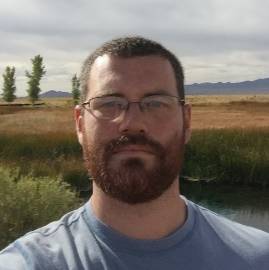
Ryan S. Morini, Ph.D.
Research Interests
- Oral History
- Social Memory
- Native Americans and Settler Colonialism in the Great Basin
- Native American and Indigenous Studies
- African American History in the Gulf South
Biography
Ryan S. Morini is the Director of Community Oral History Collections at the McCall Library at the University of South Alabama, as well as an Assistant Professor of Anthropology in the Department of Sociology, Anthropology, & Social Work. He also serves as the faculty sponsor of the Native American Student Association as of fall 2025. He received his BA and MA in Comparative Literature concurrently at Penn State University with a minor in Anthropology, and his PhD in Anthropology from the University of Florida. Dr. Morini is an ethnographer and oral historian whose primary research focuses on settler colonialism and Western Shoshone (Newe) history in Nevada. His oral history work has led to a secondary focus on Black history in Florida and the wider Gulf South.
Beginning in graduate school and continuing after completing the PhD, Dr. Morini worked at the UF Samuel Proctor Oral History Program from 2010-2020, developing expertise in not only the research and interviewing dimensions of oral history, but also other aspects of best practices such as the intensive archiving and back-end processing work that are necessary for properly curating each interview. One of his main objectives at the McCall has been to establish and streamline this processing and apply it to legacy collections as well as new interviews, making these narratives more accessible to the public both as audio recordings and transcripts. Many of these interviews are now available on the USA digital platform JagWorks: https://jagworks.southalabama.edu/oral_histories/.
Dr. Morini’s research in Nevada focuses on the region around the Duckwater Shoshone Reservation and the Ely Shoshone Reservation, examining the unfolding of settlement with a view to the interplay of its permanence and impermanence, generating US statehood but leaving an ephemeral record of ghost towns and failed mines in its wake. During this same period, federal classifications of Newe shifted, administratively separating “reservation Indians” from “non-ward” or “non-reservation Indians” with significant political and social implications. By attending to Newe voices in the archive and through oral history, and paying attention to varying forms of Newe survivance and resurgence, Dr. Morini examines the gaps and convergences between these differing claims to permanency and settlement.
Publications
Morini, Ryan S. (2019). “What Are We Doing to These Shoshone People?”: The Ontological
Politics of a Shoshone Grinding Stone. American Anthropologist 121(3): 628-640.
Courses
- AN 340 Native American Cultures
- HON 390 Oral History and Civic/Community Engagement
- NAS 101 Intro to Native American Studies
